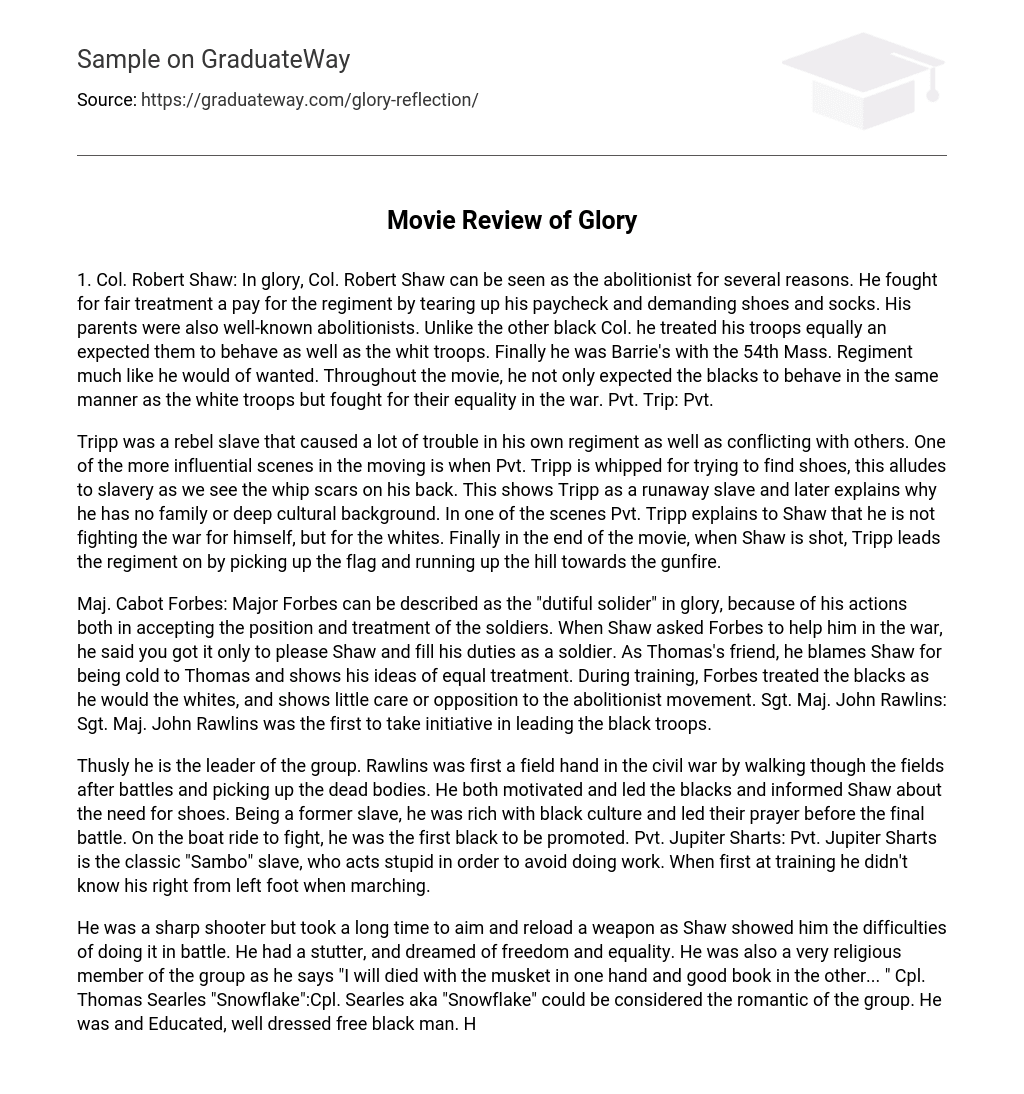1. In the movie, Col. Robert Shaw can be regarded as an abolitionist due to various reasons. Firstly, he fought for fair treatment and payment for his regiment by tearing up his own paycheck and demanding proper provisions like shoes and socks. Moreover, his parents were renowned abolitionists themselves. Unlike other black Colonels, he treated his troops equally and held them to the same standards as the white troops. He ultimately led the 54th Mass. Regiment with the same dedication and passion he would have desired. Throughout the film, he not only expected the black soldiers to behave just like their white counterparts but also fought for their equality in the war. Pvt. Trip: Pvt.
Tripp, a rebellious slave, caused trouble within his own regiment and clashed with others. One of the most significant moments in the film occurs when Pvt. Tripp endures a whipping for attempting to find shoes, revealing the lasting scars on his back as a reminder of his enslavement. This confirms Tripp’s status as a runaway slave and provides insight into his lack of family or strong cultural roots. In another scene, Pvt. Tripp confesses to Shaw that he is not fighting the war for himself, but rather for the benefit of the white population. Finally, towards the movie’s conclusion, when Shaw is shot, Tripp bravely takes charge of the regiment, lifting the flag and charging towards the gunfire while leading the others.
Maj. Cabot Forbes, known as the “dutiful solider” in Glory, demonstrated his commitment to his duties and treatment of soldiers. When Shaw asked for his help in the war, Forbes willingly accepted to satisfy Shaw and fulfill his soldier obligations. As a friend of Thomas, he holds Shaw responsible for his coldness towards Thomas and expresses his belief in equal treatment. During training, Forbes treated black soldiers just as he would treat white soldiers and showed little concern or opposition to the abolitionist movement. Sgt. Maj. John Rawlins was the first to take the lead in guiding the black troops.
Thus, Rawlins serves as the group’s leader. He initially worked as a field hand during the civil war, traversing the fields after battles and collecting the deceased bodies. He not only motivated and guided the black soldiers but also brought to Shaw’s attention the necessity for shoes. Having once been a slave, he possessed a wealth of black culture and led their prayers before the ultimate battle. During the boat journey to the frontline, he became the first black individual to receive a promotion.
Pvt. Jupiter Sharts exemplifies the archetypal “Sambo” slave, feigning stupidity to avoid work. Upon his initial training, he struggled to distinguish between his right and left foot while marching.
He was a skilled marksman but took a significant amount of time to aim and reload a weapon as Shaw demonstrated the challenges of doing so in battle. He had a speech impediment and had aspirations of freedom and equality. He also held strong religious beliefs, as he stated, “I will die with the musket in one hand and a good book in the other…” Cpl. Thomas Searles, also known as “Snowflake,” was often regarded as the group’s romantic. He was an educated, well-dressed African American man who happened to be a childhood friend of Shaw. He imparted knowledge about inner goodness to his comrades and taught them how to read.
Despite his upbringing in a predominantly white society and being marginalized from black culture, he was the first to step forward and enlist in the 54th Mass. Despite facing initial discrimination, he fought alongside others for equal rights. In response to the formation of the 54th Mass during the Civil War, the CSA issued a warning that any leader of a black regiment would be hanged and any black soldier would be returned to slavery without delay. This measure was taken to quell uprisings in the South and out of concern for potential retaliation from enslaved individuals.
Despite their disapproval of disrupting the social order of slaves, they wrote a letter to Lincoln in an effort to persuade both slaves and white officers to resign. However, this attempt was unsuccessful as it not only caused a small decrease in numbers but also instilled fear among the slaves, motivating them to work harder to avoid being enslaved again. Ultimately, this approach proved impractical because the slaves were aware that joining the war would probably lead to their demise, thereby failing to bring about any notable changes. Instead, it discouraged potential volunteers and reduced the number of officers.





